Angela Slatter's Blog, page 53
September 20, 2016
AJ Fitzwater: Splintr
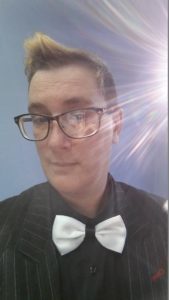 AJ Fitzwater is a meat-suit wearing dragon who lives between the cracks of Christchurch, New Zealand. A graduate of Clarion 2014, they were awarded the Sir Julius Vogel Award 2015 for Best New Talent. Their work has appeared in such venues of repute as Shimmer Magazine, Beneath Ceaseless Skies, Andromeda Spaceways Inflight Magazine, Crossed Genres Magazine, Lethe Press’ “Heiresses of Russ 2014”, Twelfth Planet Press’ “Letters to Tiptree”, Random Static’s “Regeneration: New Zealand Speculative Fiction 2” and many others. Their ideal dinner party guests would include James Tiptree Jr, Joanna Russ, Anne McCaffrey, and Freddie Mercury. Twitter: @AJFitzwater
AJ Fitzwater is a meat-suit wearing dragon who lives between the cracks of Christchurch, New Zealand. A graduate of Clarion 2014, they were awarded the Sir Julius Vogel Award 2015 for Best New Talent. Their work has appeared in such venues of repute as Shimmer Magazine, Beneath Ceaseless Skies, Andromeda Spaceways Inflight Magazine, Crossed Genres Magazine, Lethe Press’ “Heiresses of Russ 2014”, Twelfth Planet Press’ “Letters to Tiptree”, Random Static’s “Regeneration: New Zealand Speculative Fiction 2” and many others. Their ideal dinner party guests would include James Tiptree Jr, Joanna Russ, Anne McCaffrey, and Freddie Mercury. Twitter: @AJFitzwater
1. What inspired your story, “Splintr”?
I have notebooks and documents full of idea scraps – a line, phrase, character sketch, idea, images. One of these scraps was the first line, “It was the last sunset on Earth. Again”, which I’d been trying to make into a story for a couple of years but just wouldn’t gel. When the call for this anthology came up, I immediately knew it would be the perfect opener for an end of the world scenario set in New Zealand. I also played with the concept of the physical edges of New Zealand – shoreline, mountain tops – and the imagery of an eye closing on the world kept coming back to me. The movie version of “The Quiet Earth” also had an influence on the empty spaces and the concept of holding a psyche together (or not) and travel within those empty spaces.
2. What appealed to you about this project?
Since I joined the New Zealand speculative fiction writing community over 6 years ago, there have been some brilliant anthology projects showcasing our national talent. To be a part of these projects and being able to share our unique style of speculative fiction with the rest of the world is quite an honour. The creators, editors, and publishers of anthologies like “A Foreign Country”, “Tales for Canterbury”, “Regeneration II”, “Baby Teeth”, and now “At The Edge” are all dedicated to lifting up each other’s voices onto the world stage.
3. What do you love about short stories?
The ideas and possibilities of language. Doing strange and wonderful things with words tickles me purple. The short form gives me the opportunity to explore a single idea, try to contain it within a few thousand words, and yet let that idea live for the reader beyond the foundation of those words. I want my short stories to be conversations with the great short stories that came before mine, the politics of today and tomorrow, and reach out to the stories of the future.
4. Can you remember the first thing you ever read that made you want to write? 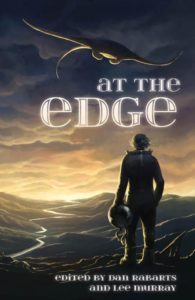
I cite Anne McCaffrey’s Pern as the books that made me fall in love with science fiction and fantasy, but it was Melanie Rawn’s Sunrunner books that made me think “Wow, I wish I could have written THAT!” The imagery of the colours, gemstones, and dragons, the politics, the magic, and the myriad of complex women Rawn created is a physical taste in my mouth to this day. It’s no coincidence that I have a tattoo of a dragon from one of those book covers.
5. What’s next for you?
My long term goal is to publish a collection of my short stories. In the short to medium term, I aim to be published in all the major SFF short fiction venues – I’ve always got a couple of stories on the go in between drafting and editing mode. In the next 12 months, I’m planning a trip to Worldcon in Helsinki.
September 18, 2016
Reminder: Melbourne Short Story Workshop
 Just a reminder that I’m running a three-hour short story workshop in Melbourne next month. Details are here. The deadline’s been extended to Sunday 25 September – you need to submit a story as that’s what we’ll be working on: getting it into shape for submission.
Just a reminder that I’m running a three-hour short story workshop in Melbourne next month. Details are here. The deadline’s been extended to Sunday 25 September – you need to submit a story as that’s what we’ll be working on: getting it into shape for submission.
Best suited to those who’ve already got some experience of writing and publishing.
September 15, 2016
And double squeeeee!
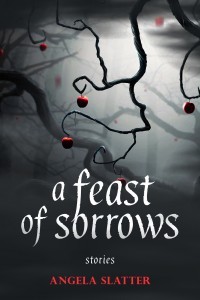 A second early review of A Feast of Sorrows: Stories!
A second early review of A Feast of Sorrows: Stories!
“A Feast of Sorrows assembles fourteen stories, two originals and twelve reprints, which provide a fascinating showcase of Slatter’s extraordinary talent as a gifted storyteller and a devoted scholar of the mysteries of human soul.”
Thanks, Mario Guslandi at HellNotes!
And this on The Tallow-Wife novella in the collection: “Part of a forthcoming new collection, “The Tallow-Wife” is a remarkable narrative tour de force — it’s a dark comedy portraying the downfall of a family, some members of which hide unspeakable secrets.”
The rest is here.
A Feast of Sorrows – Starred Review in PW!

 A Feast of Sorrows: Stories
A Feast of Sorrows: StoriesAustralian speculative fiction author Slatter’s U.S. debut is a compilation of her most notable stories along with several new ones, all of which showcase her incredible talent for enlivening fairy tale and folkloric fiction. Some, such as “Light as Mist, Heavy as Hope,” rework familiar tales, often bringing female figures into the limelight as the protagonists. Others, such as “The Coffin-Maker’s Daughter,” feature women struggling against those who have wronged them. The bonds of family are sometimes treacherous, as in “By the Weeping Gate” and “Sister, Sister.” Slatter’s prose is reminiscent of oral storytelling; there is a sense that these stories are legends that have been handed down from generation to generation. But the women who star in them feel like real people, not mythic figures, and are agents unto themselves, with a variety of flaws and skills that shape them into fascinating characters. Slatter’s worlds are many and diverse but feel somehow linked, and she renders them vividly. Her fiction will appeal to readers who enjoy highly inventive fantasy rooted in age-old tradition. Agent: Ian Drury, Sheil Land Associates (U.K.). (Oct.)
September 13, 2016
Anthony Panegyres: Crossing
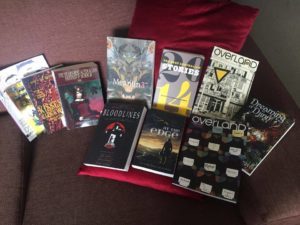 Continuing the series of At the Edge posts, Perthite Anthony Panegyres talks about “Crossing”.
Continuing the series of At the Edge posts, Perthite Anthony Panegyres talks about “Crossing”.
Since 2011, Perth short story writer and PhD candidate at UWA, Anthony Panegyres, has had numerous stories published in anthologies and also Australia’s premier literary journals (Meanjin and twice in Overland). He has also been an Aurealis Award Finalist for Best Fantasy Short Story (republished in The Best Australian Fantasy & Horror, 2011). His most recent stories have been published in the anthologies: The Best Australian Stories 2014 (ed. Amanda Lohrey) and Bloodlines (ed. Amanda Pillar).
1. What inspired your story?
I’m a writer who enjoys a technical challenge and “Crossing” was quite an experimental story. I think it’s the first story I’ve written in first person present, which naturally leads to a strong voice. I was inspired by Will Self at the time – an author who takes satire to whole new levels. I found that I had to really peel back what I’d written as the initial voice was so biting it risked alienating most readers.
Another technical aspect was incorporating a gentle twist into the middle, rather than the more traditional (and sometimes ‘dated’) twist at the end. I wanted to see if I could hold the reader when Jane’s world is flipped at the half-way point of the story. I have Michael Swanwick’s clever story “The Bordello in Faerie” to thank for that in a structural sense – although the subversion is by no means as sharp as Swanwick’s. I think readers of both stories may not pick up on the influence but it’s there.
In terms of ideas, anachronisms have always interested me. I’ll spoil the story if I give too much of the world of Adeville away but it’s a world where anachronisms abound – and it’s also a story where the past and present collide.
“Crossing” explores past and present relationships, which I consider a nostalgic (and a challenging) part of life for most people to deal with. We don’t always simply ‘move on’– most of us take the past (or at least a part of it) with us.
2. What Appealed to You about the Project
To be honest, I had this story ‘almost ready’ when fellow Perth writer, Martin Livings alerted me to the submission opportunity (nice to see both of our stories ended up finding a home in the anthology). When I say almost ready, I mean just that: I had to amp up Jane’s Adevillian relationship so that it could move into the realms of a warmer narrative. I mellowed the satirical side – if the story is challenging now then readers would have been kapowed by the earlier version.
Once involved in the anthology, however, I was grateful. I’d been in an anthology with Dan Rabarts previously (Dreaming of Djinn, ed. Liz Grzyb) and really admired and enjoyed his own story in it: “Silver, Sharp as Silk”, so I was excited to see what he’d bring to the table this time around as an editor in At the Edge. Both Lee Murray and Dan Rabarts were consummate professionals throughout the process. Their genuine care is intoxicating,which makes working with the duo a delight. I think any publisher in the industry would benefit from their magic.
The Antipodes is an exciting place to be for short story writers. I can’t wait to read Joanne Anderton’s story. I loved her work in Bloodlines (ed. Amanda Pillar) and the three stories I’ve read of hers have been great.
Having an inclusive cross-Tasman relationship is special. Donald Drumpf would have built a gigantic sea wall across the Tasman – or raised a few kraken….
3. What do you love about Short Stories? 
Does this give me a chance to rave?I read some of Stephen Donaldson’s stories as a thirteen year old but outside of that I must have kept myself in the dark regarding the short story genre. The sad reality is that high school students are given flash fiction stories to study, and these don’t allow for the depth of character and relationships that the longer short story provides. In essence, students are given a false representation of what a short story is. In actuality, most anthologies require a story of a minimum of three thousand words or so. That’s a stark contrast with the few pages students are presented with in high school.Imagine the benefits to the genre in the long run if opportunities are provided to read the lengthier short story form at high school.
I think I fell in love with the genre when I read Jonathan Strahan & Charles N. Brown’s Locus Awards Anthology in my late teens. And during postgrad, I did a wonderful unit a few years ago in the genre short story.We studied writers like Nalo Hopkinson, Chitra Banerjee Divakaruni and Joyce Carol Oates, and writers of that ilk had me hooked on the form and on the search for more. I’m now an avid reader of the genre. I love the variety and experimentation that comes with the territory. It’s a venue in which ideas and styles can be explored that may not be achievable or workable at longer lengths.
4. Can you remember the first thing you ever read that made you want to write?
I made some poor attempts at impersonating JRR Tolkien in primary school. And then made similarly poor attempts from Years 6-8 impersonating writers who, in their own turn, were very close to impersonating Tolkien: the Terry Brooks, Stephen Donaldson, Weis & Hickman mould. Not that these writers or high fantasy as a genre is bad, in fact the opposite, they kept me reading during my young teens.
5. What’s Next for You?
Fingers crossed, I’ll have a couple of stories in line for next year. One anthology was put on hold. And I’ve a novella/novellette also being held, so I’m hopeful. I don’t think I have anything else left in the trunk…
I have a job that I love but does take up a lot of time and I’m also in the middle of my PhD candidature. Having said that I am working simultaneously on a novel and another novella. I feel the former is further ahead than the latter. Ideally, if I find the time, I’ll write another story.
Other than that I’ll be reading. I’m almost at the end of The Inheritance of Loss by Kiran Desai, and I’m reading That Glimpse of Truth by David Miller (an anthology of 100 short stories), All the Time in the World: New and Selected Storied by E.L Doctorow and The Great Sea: A Human History of the Mediterranean by David Abulafia. My book club has chosen The Natural Way of Things by Charlotte Wood. And after that I’ll be sinking my reading teeth into At the Edge.
September 12, 2016
Supanova!!!
 Excitement plus!
Excitement plus!
I’ll be one of the guests at Supanova this November in Brisbane and Adelaide!
Writing peeps will include Alan Baxter, Alison Goodman, Maria Lewis, Peter V. Brett, Lian Hearn, et al!
September 7, 2016
A Feast of Sorrows: Stories …
 … is almost here. It will be out next month! You can pre-order it.
… is almost here. It will be out next month! You can pre-order it.
Ze blurb:
A Feast of Sorrows — Angela Slatter’s first U.S. collection — features twelve of the World Fantasy and British Fantasy Award-winning Australian author’s finest, darkest fairy tales, and adds two new novellas to her marvelous cauldron of fiction. Stories peopled by women and girls — fearless, frightened, brave, bold, frail, and fantastical — who take the paths less traveled by, accept (and offer) poisoned apples, and embrace transformation in all its forms. Reminiscent of Angela Carter at her best, Slatter’s work is both timeless and fresh: fascinating new reflections from the enchanted mirrors of fairy tales and folklore.
Praise for A Feast of Sorrows: Stories
“Angela Slatter’s newest collection is an exemplary specimen of that endangered genre: fairy-tale retellings that read as something wholly original and fresh. Dark, bold, visceral, and sly, full of smart fierce girls and women saving each other; all in all reminiscent of nothing so much as Angela Carter’s best. One of the strongest thematic undercurrents here is that of transformation, as expected of most folklore worth its salt. These, however, are transformations couched in a metafictional nesting-doll of source material. Here are heroines who are aware not only of the well-worn paths they tread, not only of the dark woods of which they are on all sides beset, but also that some paths are meant to be strayed from, and that new paths are made in so doing. ” ~ Nicole Kornher-Stace, author of Archivist Wasp
“Angela Slatter’s stories pierce your skin and burrow deep, never to be forgotten.” ~ Marianne de Pierres, author of Peacemaker and the Sentients of Orion series
“An evocative, mysterious and memorable collection of stories told with wit, wisdom and humour; combined with a perfect pinch of dread and darkness.” ~ Garth Nix, author of The Old Kingdom and The Keys to the Kingdom series
“Angela Slatter’s new collection is full of heart-breaking fairy tales — not in the sanitized modern sense, but in the original style which used compelling stories to mask warnings. They combine timeless peril and beauty.” ~ Mary Robinette Kowal, author of The Glamourist Histories series
“Angela Slatter’s stories, like the fairy tales of old, are steeped in blood and darkness. To step into them is to immediately feel the presence of old energies, to hear the whisper of dreadful warnings. Building upon the foundations of the fairy tales, these stories are layered with character, narratively sophisticated, and galvanized by a beleaguered wisdom. With this wide release of stories previously only available in limited editions, the world at large is about to discover what some of us have known for years: Angela Slatter writes some of the darkest, most beautiful stories in the world today. ” ~ Nathan Ballingrud, author of North American Lake Monsters
Over at Peter M. Ball’s place …
BWF Most Wanted
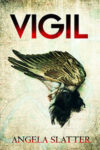 Tomorrow night (Friday 9 Sept) I’ll be doing a reading from Vigil (which I’ve never done before!) at the BWF Most Wanted session on Maiwar Green at 7.30pm.
Tomorrow night (Friday 9 Sept) I’ll be doing a reading from Vigil (which I’ve never done before!) at the BWF Most Wanted session on Maiwar Green at 7.30pm.
I’m lucky because I get to perform with Caroline Overington, Justin Cronin and Gary Kemble!
It’s a free session, but it won’t hurt to book yourself a place. Go here.



September 6, 2016
Anniversary
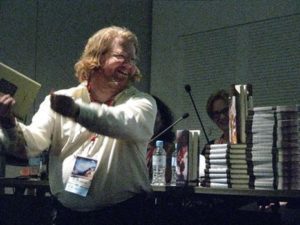 Facebook has just reminded me that today’s the anniversary of The Girl Wi
Facebook has just reminded me that today’s the anniversary of The Girl Wi th No Hands and Other Tales!
th No Hands and Other Tales!
To the left is Russell B. Farr of Ticonderoga Publications in full flight, launching TGWNH and the phenomenal Kaaron Warren’s Dead Sea Fruit. We were at AussieCon4 in Melbourne, Australia’s last hosting of the clans for WorldCon.
TGWNH went on to win the Aurealis Award for Best Collection, which was nice! Cover by my gorgeous Brain, Lisa L. Hannett.
This means it’s also the anniversary of Sourdough and Other Stories, which came out from Tartarus Press a couple of weeks before TGWNH!

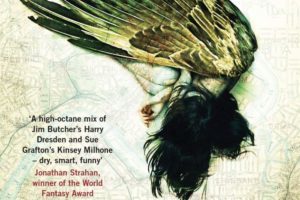 … I ate all the cupcakes and talked about Vigil and the writing craft.
… I ate all the cupcakes and talked about Vigil and the writing craft.

